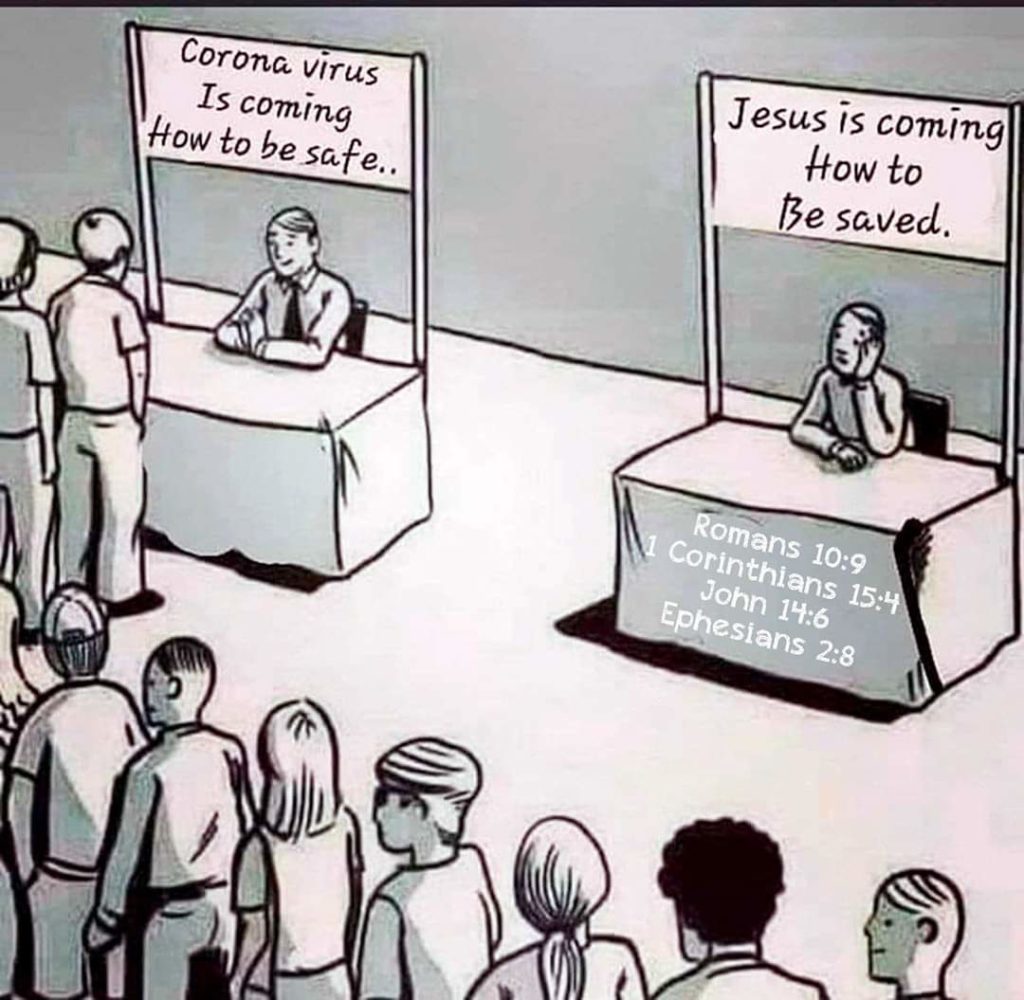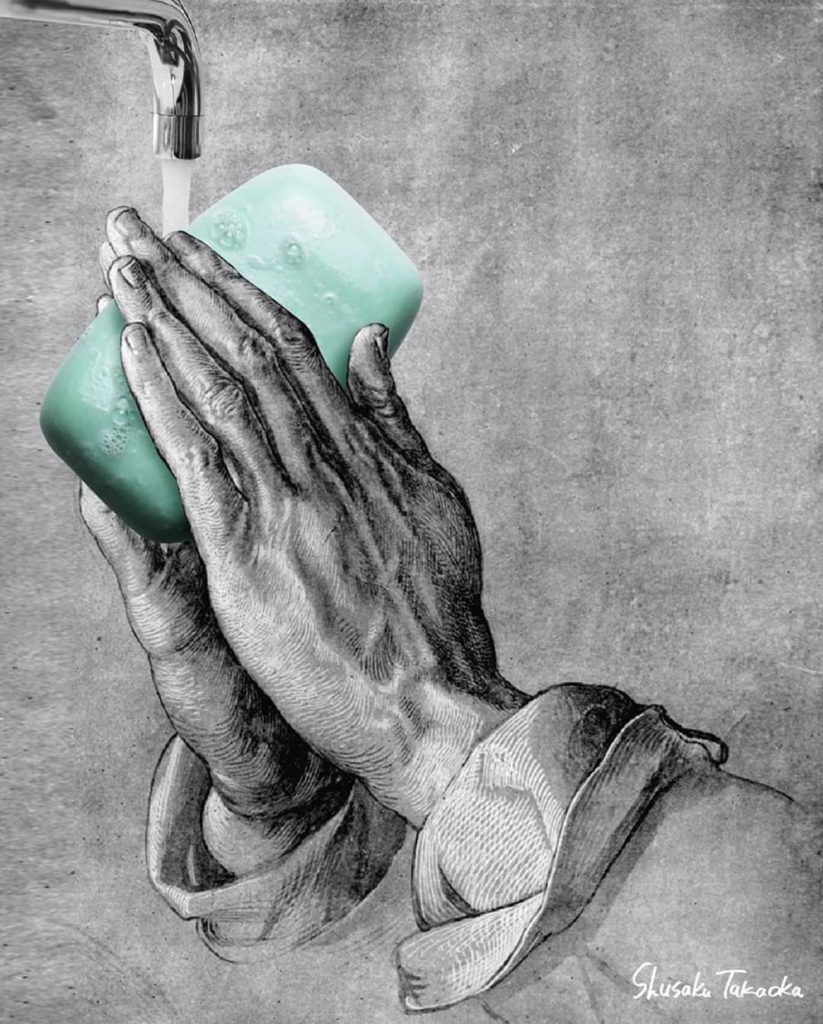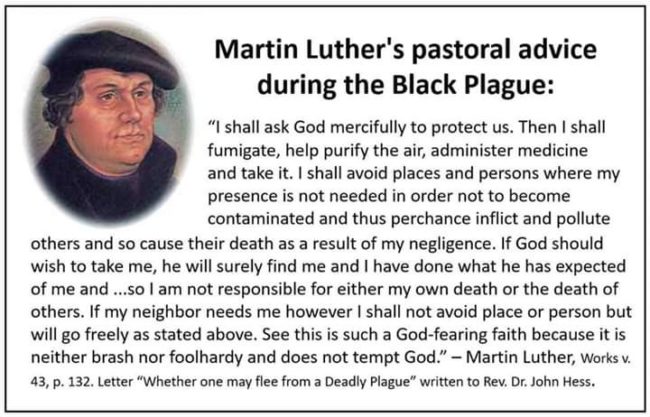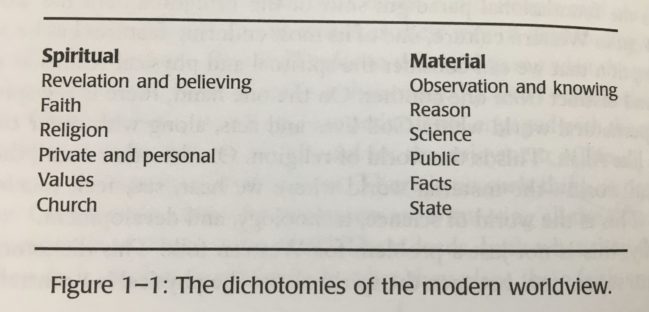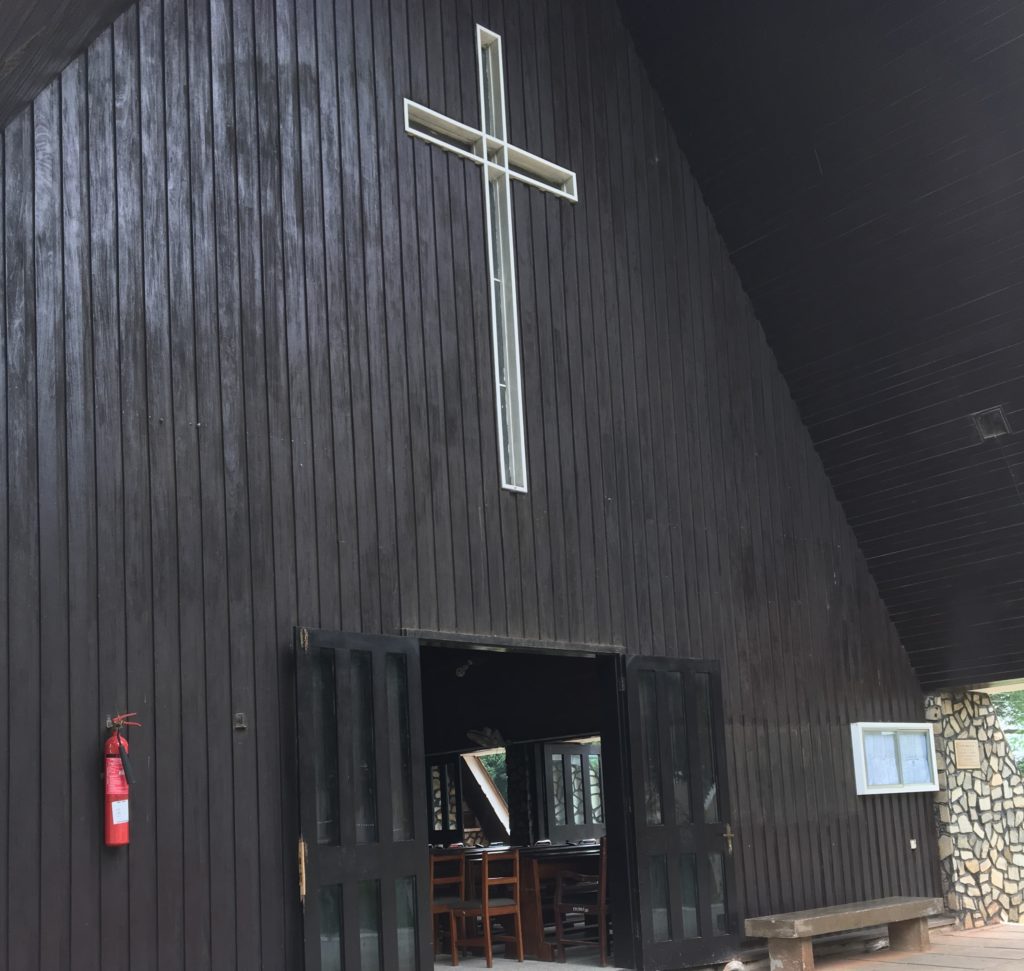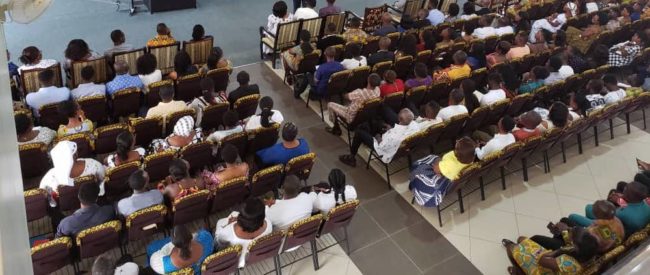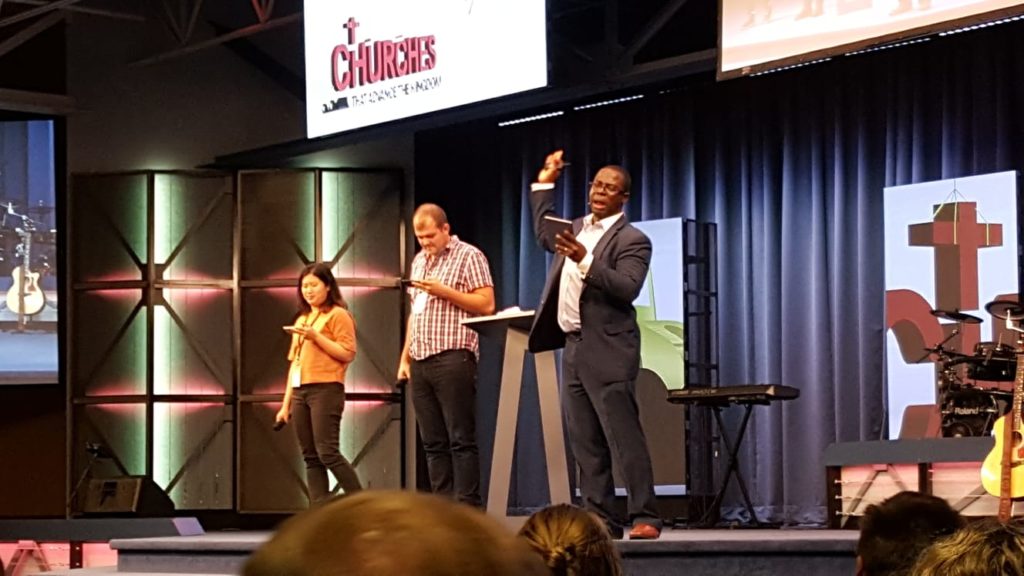COVIDic Times: BE AFRAID.
If we peeled the pandemic panic layer by layer what would we find lies beneath—what are people really afraid of? While not wanting to spread panic is there not a place for encouraging people to “be afraid”?
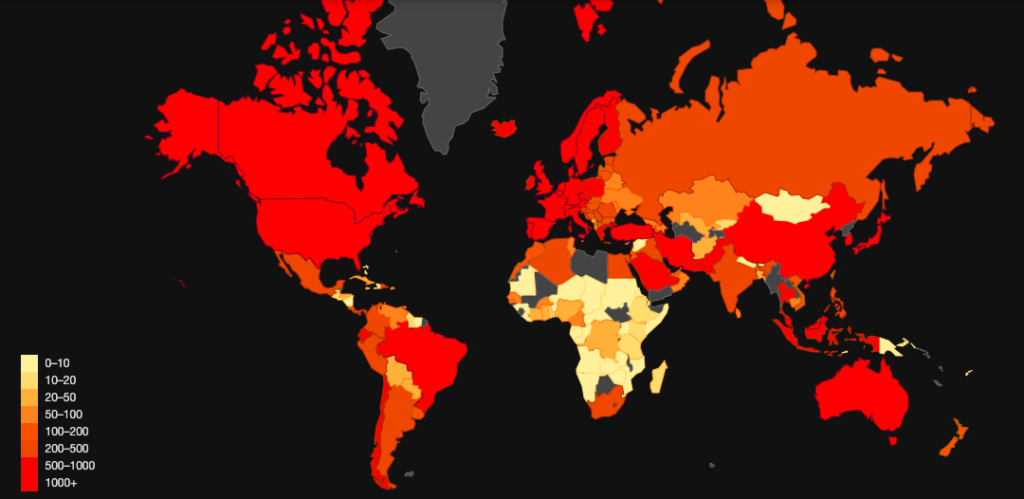
Map showing various degrees of the COVID-19 pandemic globally as of March 23, 2020 (credit: covid19info.live)
The tongue-in-cheek saying that everyone wants to go to heaven but no one wants to die seems rather apt in these COVIDic times. But really, what’s so bad about dying? Most people don’t seem to care enough about how many are recovering but rather fixated on how many are catching the disease and especially how many are dying. At the time of writing this article, the number of COVID-19 cases in the world was nearing 350,000 in 190 countries with approximately 15,000 deaths. These are not just statistics, numbers; they are real people made in the image and likeness of God, with families and friends to mourn them. May their souls rest in peace.
Much of the world is gripped in fear. But I’ve been wondering what people are really afraid of: is it getting sick per se or dying or what happens when they die? It is good to pause and ask yourself the same question, peeling back layer after layer until you find the root cause of any iota of fear that you might have/have had during this pandemic.
BE AFRAID
There have been many scripture verses and motivational messages to calm people down. This is the time preachers remind us that “there are 365 ‘fear nots’ in the Bible, one for each day of the year;” except 2020 has 366 days. Even governments have used hashtags like #SpreadCalmNotFear. While I’m of the preachy and motivational stock and have done my part to share love, spread hope, shout “fear not!” and even generate laughter amidst the virus storm I want to take a sober pause and say BE AFRAID.
Being afraid can be a good thing (or we will all do stupid things). But we ought to be afraid of the right things. It’s a good thing to be afraid to break the law, for instance, or to go after someone’s spouse. Not everyone likes Jesus Christ but no one, not even his sworn enemies, can ignore the fact that he is a real historic figure (it would be as ridiculous as saying Napoleon or Hitler never existed just because you don’t like him), was a prophet and miracle worker (two things both Christians and Muslims agree on), lived a perfectly upright life (unlike every other prophet) and teacher par excellence. Even in a raging storm (like COVID-19 has become in our day) he questioned his disciples”why are you so afraid?” while he rebuked the winds and spoke to the waves and stillness came.
In his often paradoxical pedagogy, once upon a time this teacher par excellence said not to be afraid and to be afraid in the same breath: “Do not be afraid of those who kill the body but cannot kill the soul. Rather, be afraid of the One who can destroy both soul and body in hell” (Matthew 10:28). What did he mean?
DEATH ISN’T WHAT YOU THINK
The new Coronavirus named SARS-CoV-2 that causes the disease COVID-19 can kill the body (your hardware). Ask Italians; 5,500 of them hav died already (at the time of writing). But it cannot kill the soul (your software). Yes, death is “the permanent ending of vital processes in a cell or tissue” or “cessation of all biological functions that sustain a living organism,” and that is good Biology, but death is more than that (according to ‘Soulogy’).
Many equate death with total annihilation. In other words, that once a person dies they just finish; disappear into thin air. C’est fini. That’s it. But no. Death actually means separation. Or as Finis Jennings Dake would put it, “a cutting off from realizing God’s purpose for which he was created. One can logically substitute the word separation for death in every scripture where it is used” (Dake 1991, 619). Consequently being tripartite beings–made up of spirit, soul and body–there are three kinds of death:
1. Physical Death–this is when your spirit and soul (inner man) are separated from your body (outer man). That is where biologically all functions, including brain function, that sustain a person cease permanently, from the micro (cellular) level to the macro (systemic) level. This separation of the soul and spirit from the body is the kind that as a medical doctor I would sometimes (unfortunately) be called upon to confirm: no breathing, pulse not palpable, dilated pupils not reacting to light etc. This physical death is what most people think about when it comes to the subject or our mortality, especially in these COVIDic times. But there is more.
2. Spiritual Death—this is the temporal separation of your spirit and soul from your Source/Maker/God. Or as evangelists like the late Billy Graham would plainly put it, separation of man from God because of sin. According to a Biblical worldview, the moment our forefathers Adam and Even sinned against God in the Garden of Eden, at that very moment (as promised by their Maker) they died. As a little boy I always used to wonder whether God lied about them dying as soon as they ate the forbidden fruit because they were very much alive after that, even running away from God! Now I know that what happened to them immediately was death alright–they were instantly separated from God—spiritual death. Their physical death came later. Hopefully, this makes us understand why since we as Homo sapiens are all descended from that first couple, all of us have inherited the spiritual genetic disease of sin and are born dead. Everyone of us is born separated from God spiritually, thanks to the pandemic from the virus SIN-00.
Paul puts it this way in his letter to the Christ followers in first century Rome: “for all have sinned and fall short of the glory of God” (Romans 3:23). He follows up with the consequences of this, three chapters later: “For the wages of sin is death, but the gift of God is eternal life in Christ Jesus our Lord” (Romans 6:23). Logically, therefore, if we are all sinners by nature and the salary for sin is death then we are all the living dead, from pope to prisoner, separated from our Maker.
3. Eternal Death—this, finally, is being separated from God forever in the lake of fire (hell). This, in scripture, is sometimes called “the second death” because follows “the first death” (physical death). Unlike spiritual death, this is eternal, forever. But eternal death is not entirely unavoidable. This will only happen to those who continue to live in their state of spiritual death until they physically die or Jesus Christ returns. If you remain in your state of spiritual death and you physically die you will eternally die. But there is a big IF because Paul again says that inspite of our state of spiritual death, “But God demonstrates his own love for us in this: While we were still sinners, Christ died for us” (Romans 5:8). God doesn’t just have love; God is love. He does not want anyone to be a victim of eternal death. “For God so loved the world that he gave his one and only Son, that whoever believes in him shall not perish but have eternal life. For God did not send his Son into the world to condemn the world, but to save the world through him.” (John 3:16-17)
Those who hear about Jesus Christ and believe in him as the Son of God who came to die in our place—beyond being a mere historical figure, prophet and miracle worker, righteous man, and great teacher as introduced above—receive his life in exchange; for the only reason he died as a perfect, sinless man was as a sacrifice for you and me. He died a temporal physical and spiritual death he did not deserve in order that you and I could receive eternal life rather than the death sentence on us because of our sinful nature (plus our own sinful deeds on top of that). To the legal luminary Paul, “If you declare with your mouth, “Jesus is Lord,” and believe in your heart that God raised him from the dead, you will be saved. For it is with your heart that you believe and are justified, and it is with your mouth that you profess your faith and are saved“ (Romans 10:9,10).
HOW TO NEVER DIE | THE CURE
So back to COVID-19, fear and Jesus. There is a virus (SIN-00), infinitely more dangerous than SARS-CoV-2 because it has eternal consequences, that has caused a spiritual pandemic with a manifestation of physical brokenness for thousands of years. Jesus Christ says do not be afraid of SARS-CoV-2 and its resultant disease COVID-19 which can kill the body (physical death) but cannot kill the soul (spiritual and eternal death). Be afraid of (or have deep reference for) the One who because of SIN-00 will at the end of the age, as a result of your own choice not to accept the free gift of eternal life, hand you your eternal ticket to a place of eternal separation from Him. I think inasmuch as the fire described in hell is horrific, the real penetrating eternal pain is the forever separation from Love—for God is Love. This is eternal death.
Who doesn’t like cures? Imagine it were announced today that there was now a definitive cure for COVID-19, not just the Chloroquine being experimented with now! How quickly people will line up for it! Well, let me tell you how to never die, COVID-19 or not.
One day a friend of Jesus called Lazarus physically died (you may read the story here). When Jesus arrived at the scene four days later he uttered to his sister one of the most amazing words ever spoken: “I am the resurrection and the life. The one who believes in me will live, even though they die; and whoever lives by believing in me will never die” (John 11:24-26). Understanding the three kinds of death finally allowed me to make sense of this profound scripture: the one who believes in Jesus will eternally live even though they may physically die; and whoever has overcome spiritual death (lives; now has eternal life) by believing in Jesus will never eternally die!
Then Jesus asked Martha, sister of Lazarus, “Do you believe this?” Her response was “Yes, Lord.” And she elaborated further, “I believe that you are the Messiah, the Son of God, who is to come into the world.” May I ask you too: “Do you believe this?” If not, be afraid.
Reference
Dake, Finis J. 1991. Dake’s Annotated Reference Bible. Lawrenceville, GA: Dake Bible Sales Inc.
POST SCRIPT
For those not in my social media circles you wouldn’t know just how much faith, hope and love I’ve been pouring onto the world. I feel the global body of Christ has been very pastoral in this COVID-19 pandemic (much needed, of course) but we ought not to forget our other hand/arm to be evangelistic as well.
It was at the third Lausanne Congress on World Evangelization, Cape Town 2010, that I heard for myself John Piper passionately proclaim the two truths with such wisdom and clarity: “…could the evangelical church say—we Christians care about all suffering, especially eternal suffering? I hope we can say that. But if we feel resistant to saying “especially eternal suffering,” or if we feel resistant to saying “we care about all suffering in this age,” then either we have a defective view of hell or a defective heart” (emphasis mine). Full script and video here.
God help Christ followers balance being pastoral and being evangelistic at this time; ambidextrously handling the rod and staff; flying with both wings of social concern and evangelism, “two wings of the same bird” for the blessing of all peoples of all nations and to God’s glory!
COVIDic Times: Don’t Pitch Faith and Science Against Each Other!
It’s never a good time to pitch religion and reason against each other but certainly not in a time of crisis, especially the kind of COVID-19 pandemic which requires “all [washed] hands on deck!”
Much of my time this morning was spent going back and forth debating on my Achimota School 1995 WhatasApp platform because one member forwarded what was purported to be a Tweet from a prominent Ghanaian journalist: “A country that invests in a $100 million cathedral, and not in medical research, can only pray in times of a global pandemic and hope to profit from the labs of countries that invest in science and technology.”
BLOW AWAY THE CHAFF
The last thing we want to be doing at this time is to pitch faith and science against each other, but before delving into that let me first quickly get rid of the disingenuity of the above statement which seems smart, even sassy, at face value. 1. The $100 million (if that is even accurate) is being raised by a Ghanaian Christian community that for the last 200 years has invested heavily not only in the faith of the Ghanaian people but in agriculture, schools, hospitals (including these supposed medical research centres) and the like. The government of Ghana isn’t raising the money for the cathedral–they gifted the land and seed money as their contribution but the body of Christ in the nation is doing the rest. 2. As I’ve stated elsewhere, nation building is complex: “We are building a nation here, a cohesive entity that must have spirit; not just a conglomeration of social services!” 3. Many of these countries that are being touted today as having ‘rather’ invested in science and technology have a rich faith heritage and foundation, including national cathedrals, that was part of the tide that raised them to where there are. Today they are becoming so secular to the point of amnesia! They ought to remember the rock from which they were hewn! 4. Throwing in a thorny issue at a time of national and global crises when the last thing we need is polarization is just not on; quite insensitive, actually. 5. To say one “can only pray in times of a global pandemic” is not only condescending and treating faith with disdain but unnecessarily pitting it against reason, faith and STEM. The last point is what I want to dwell on for the rest of this blog.
DOUBLE POWER
My immediate response to the said journalist’s statement is: The opposite is true also. A country that does not invest in the spiritual wherewithal of her people can only rely on science and technology, which evidently aren’t enough in the face of monstrous situations like the COVID-19 epidemic! Today, amidst the Coronavirus pandemic, doctors and scientists are using words like “hope,” “faith” and “pray.” Prayer is powerful; ask how I know!
Perhaps I’m in a unique position to speak to this issue as I am a medical doctor myself and a preacher. Double power! I prescribe medication but I also pray for people. Double power! The secular humanists only has science/technology; I have faith and science/technology. Double power! Why would anyone want to use only the right or left brain; one hand/leg instead of both (if they have them)? Why would any bird want to attempt to fly with only one wing? Why pitch faith against science when the same Lord God made both and wants everything in us and His world to be used for His glory? Double power, friends! That’s why I like the painting above that admonishes us to “wash and pray.” “Faith without works is dead,” said the apostle James. As my reverend minister likes to say, “Trust in God and lock your car.” God does miracles (the supernatural) on occasion and has also given us a bunch of principles for daily (natural) living.
Check out the double power response of Martin Luther (the Reformer) to one Rev. Dr. John Hess in a letter “whether one may flee from a Deadly Plague.”
FALSE DICHOTOMY
I have watched with amusement as various world leaders respond to the COVID-19 crisis. Again, I may be in a unique position in experiencing both ends of the spectrum as a Ghanaian (largely religious) and Canadian (largely secular). Within the same 24 hours, the Canadian Prime Minister (whose wife has tested positive and who is himself in isolation) made a broadcast admitting he was as flustered as everyone else but generously offering practical measures to curb the debacle, the Ghanaian president called a number of church denominational leaders to the seat of government (Jubilee House) to pray! I am one of the 13,000 who joined in that prayer meeting via FaceBook Live and I loved his opening remarks. He said (to paraphrase), yes we have put health measures, travel advisories, financial resources etc. in place but we need more–to call on the God of Heaven as other leaders and nations have done throughout history and even now (we know the United States presidency also called for a national day of prayer on Sunday March 15). The Ghanaian president’s kind is an endangered species, one of few in the modern world who do not separate the physical and spiritual realms.
Consider Myers’ table above. How did we get here, to a place where the modern worldview is so dichotomous?! Pitching faith and reason against each other goes back centuries, perhaps peaking during the Enlightenment (17th to 19th century) in Europe. Yet we forget that Newton, Kelvin, Faraday and a host of other scientists were people of faith, specifically of the Christian faith. Does one’s faith make them a better or worse scientist? Of course not all scientists have faith–such is the beauty of the free will of humankind.
CONCLUSION
Faith leaders, this is not a time to be playing down rigorous reasoning and true science (for o yes, there is such a thing as pseudoscience) and flouting the basic public health protocols provided. Secular leaders, this is not the moment to look down on people of faith–who knows, their prayers may be keeping you alive!
I am right-handed but would hate to be only one-handed! I am a person of faith and reason, science and religion. I admit that Truth tends to be paradoxical and managing the tension between two ends isn’t a comfortable place to be but I’d rather fly with both wings than attempt to soar on one alone–impossible! Again, let’s not fall for the tyranny of the ‘or’ but embrace the genius of the ‘and’ (Jim Collins). Wash your hands and clean your hearts. Social distancing doesn’t imply spiritual distancing. Pray hard as if everything depended on God (it really does!) and work hard (especially those of us on the medical frontlines as well as in the background slaving away in labs trying to make vaccines) as if everything depended on you (humanly speaking, it does).
In many things, our world is polarized: female versus male, poor versus rich, secular versus sacred, spiritual versus material, church versus state, private versus public, evangelism versus social action… Please let’s not add science versus faith, especially in this time of crisis!
Reference
Myers, Bryant L. 2011. Walking With the Poor: Principles and Practices of Transformational Development. Maryknoll, NY: Orbis Books.
Church in a Century of COVIDic Captivity | Epistle 3
COVID-19 TESTS: WILL THE CHURCH PASS?
By Thomas R. Bosomtwe
The Coronavirus pandemic has changed everything; including ‘church.’ This is the third in a series of random thoughts about the Church at a time when COVID-19 threatens to hold us all to ransom. Guest writer T.R. Bosomtwe examines the suspension of church services in Ghana and matters arising: a theological reflection.
INTRODUCTION
On Sunday, 15th March, 2020, I listened to the president of Ghana outline the measures government has rolled out to curb the spread of the corona virus in Ghana. As part of the measures the president has directed that all church services be suspended for the next four weeks.
The directive, as would be expected, has been received with mixed reactions. On one hand, there are those who are of the view that it is discriminatory in the sense that if church services and other religious gatherings are being suspended, then activities at the night clubs, drinking bars, restaurants, supermarkets and lorry stations should all be suspended. In fact the Bishops’ Conference has raised questions about why they were not consulted on the matter and why night clubs and chop bars have been excluded.
On the other hand, there are others who have lauded the President for this directive. While they are not too happy that church services will not hold for the next four weeks, they believe that it is one of our surest ways of preventing any further spread of COVID-19. Many churches have issued memos to their congregants and adherents asking them to suspend all church activities until further notice.
While both sides have legitimate and very strong arguments to support their positions, I hold a neutral view on the suspension of church services. Among other things, I believe there is a lot more we have to do to curtail the spread of COVID-19. The bottom line is that individuals must seriously take personal responsibility for their own safety.
The suspension of church services however, is a test for the body of Christ. It is a test for the church as a corporate body, and it is a test for individual Christians This directive, occasioned by COVID-19, will reveal how robust or otherwise our set-ups are. The way we do church in this country will definitely not be the same during and after this pandemic. Indeed, COVID-19 is testing many of the things we believe and many of the things we have been doing over the years. A few are discussed below.
1. TEST OF PRAXIS
First of all, the suspension of church services will test how we have been ‘doing’ church. The basic disciplines of the faith including personal and family devotion, personal prayer life, fellowship, commitment to holiness and evangelism we have cultivated are being tested. For the next 4 weeks, members will not be coming to church to listen to sermons. The question is will our church members survive? It depends on whether we have been ‘discipling’ our members, equipping them to live and serve Christ or we have reduced them to pastor-dependent Christians who depend on the pastor for almost everything. In the next four weeks the former will survive but the latter will tottle.
2. TEST OF LOYALTY
Secondly, the suspension will test the loyalty of church members. There are many Christians whose loyalty to Christ and to their local churches will be tested in the next four weeks. Some church members may see this suspension as a holiday and behave like school children who have been asked to go home because it rained. Others will really miss church! So, will you send your offering and tithe through ‘momo’ to church on Sunday? Would you want to know what your local church will do on Sunday and how you can support it?
3. TEST OF CITIZENSHIP
Thirdly, the suspension will test our practice of Christianity in relation to state authority. You do not need to be a prophet to predict that some ‘super spiritual’ churches will defy the directive of the President and hold their ‘regular’ church service on Sunday. Some are of the theological persuasion that it is an attack on their right to worship…and that…”they will obey God rather than man…” the real question is, how should the church relate to civil authority?
4. TEST OF SUBSTANCE
Fourthly, the suspension will make us know that people are more important than buildings. Many churches have invested huge sums of money into cathedrals, parishes, and auditoriums. Sometimes the very people who constitute the church are neglected, unattended to all because the church is building. Well, on Sunday, pastors will not have their regular members to preach to. What will become of the expensive chairs, supersonic gadgets and fittings? This is the time we need our members the most, but if we have not prioritized their needs and interests, then this time, they too will ‘show us.’
5. TEST OF TECH-READINESS
Last but not least, the suspension of church services for the next four weeks will test our preparedness for and how abreast we are with technology. I have heard with excitement some of the measures some churches are putting in place to reach their members on Sundays and all through the period when the suspension is in force; online streaming, facebook live, YouTube, radio broadcasts and the like. I also know some church leaders have no idea what these things are let alone what they are used for. It is time to embrace technology and use it to reach the masses for Christ.
CONCLUSION
Let me conclude by saying that God has a very interesting way of getting man’s attention. Sometimes “God allows the hurricanes of life to shake us into seeing that in a world of gigantic forces, we live by His permission, not by OUR good management.” Some things happen so that man will know that “there is a God in heaven who rules in the affairs of men.” By all means, let us observe the preventive protocols, but let us also pray for God’s intervention and while we are at it, let us learn the lessons that COVID-19 is bringing to all, especially the body of Christ.
________________
The author is a student of Theology and Associate Pastor with the Assemblies of God, Ghana (Holy Ghost Revival Centre, Accra). The initial version of this write-up was first published on his FaceBook wall on March 17, 2020.
Church in a Century of COVIDic Captivity | Epistle 2
DANCE DIFFERENT
By Kwamena Bello
Dear Church,
The directive of the State for a four-week cessation of church gatherings following confirmed cases of COVID-19 in Ghana is NO ATTACK on the Church; rather, it is an opportunity to extend the frontiers of our outreach and impact.
I know some of you are so peeved by the directive and you reckon this as an attack on the Church, because whilst the Church cannot have its usual gatherings, apparently nightclubs and bars are allowed to operate.
I can agree that the exception seems irrational because people do not go to nightclubs to listen to a motivational talks, but mostly, to drink, bump, wind, and grind; a classic example, that is, of close contact engagement — very fertile ground for many to pick up the virus.
That said, and be that as it may, Pastors must now kindly and urgently, release the ministry to the saints; matter of fact, your assignment as a minister is to train the saints for works of ministry (Ephesians 4:12).
Let’s use this season to focus on developing care-cell (home-cell/house fellowship/home groups) system so that the saints can serve each other more intimately with God’s gifts of grace he has given each member of the body of Christ, and by extension, their communities.
In the meantime, let’s follow the various protocols as given by the State’s health officials, which protocols – with the exception of a few – must continue even when the outbreak is finally over.
Additionally, and equally importantly, let’s invest in technology and make good use of New Media. The drumbeat changed a long time ago, hence, we cannot afford to dance the same way as we’ve done. No, not anymore.
It’s time to wake up and seize the day.
________________
The author is a Missionary Lead with the Assemblies of God, Ghana (Elevation Assembly, Accra). The first version of this write-up was made on his FaceBook wall on March 17, 2020.
Church in a Century of COVIDic Captivity | Epistle 1
The Coronavirus pandemic has changed everything; including ‘church.’ As one who loves the Church and studies her, I hope to capture my (and others) random thoughts about the Church here at a time when COVID-19 threatens to hold us all to ransom.
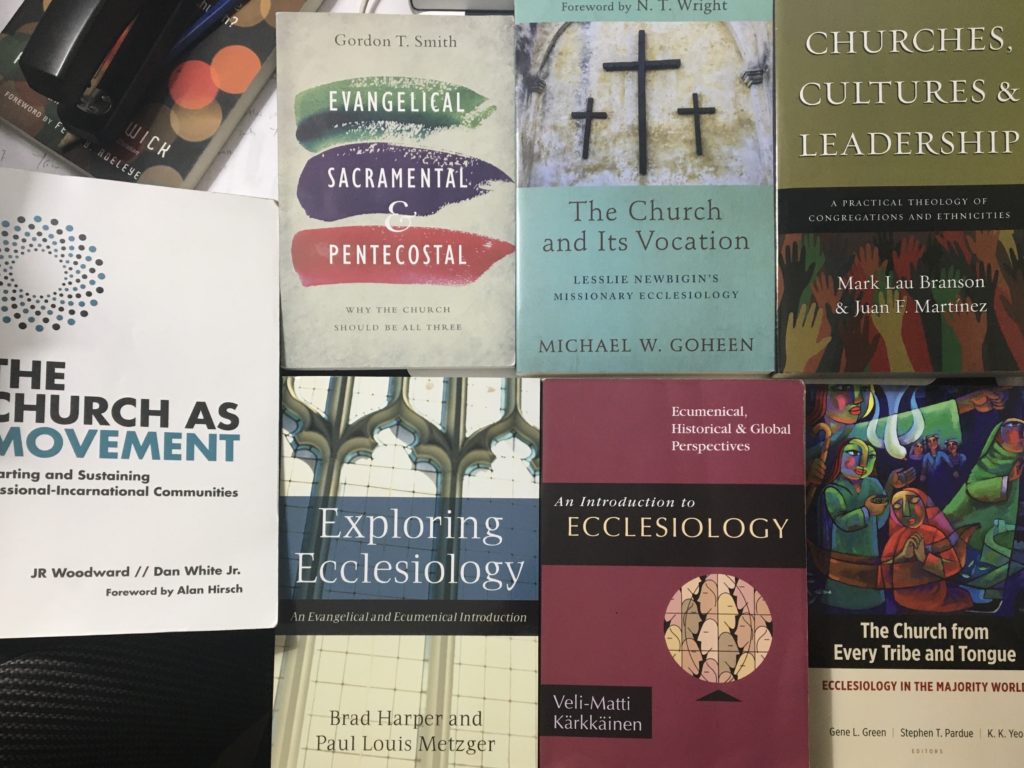
A few of my library books on ecclesiology (the part of theology that undertakes the study of the Church)
1. CHURCH IS PEOPLE FIRST
Some have been upset by various governments prohibiting the gathering of people, including churches, during this COVID-19 pandemic. In trying to make a point regarding what is the most important thing about church, I have seen well-meaning Christians ask on social media: “is church a place we go or what we do?” I’ve had to gently nudge some to say it’s both; and neither. Because church is first and foremost who we are. Church is people first, before it is what they do (‘doing church services’) or a place they go (‘going to a church meeting place/building’).
To all who believe in Jesus Christ as their saviour from their sins and accept him, God gives the right to become children of God (John 1:12). These persons become engrafted into Jesus, forming ‘the body of Christ’. “All of you together are Christ’s body,” Paul writes to the church in the commercial city of Corinth in ancient Greece, “and each of you is a part of it” (1 Corinthians 12:27). These believers in Christ and now the body of Christ are also called “the household of God, which is the church of the living God” (1 Timothy 3:15, ESV).
These people may gather at a particular place (which over the centuries has become known also as ‘church’) and conduct a ceremony (which has become known as ‘doing church’ too) but church is first and foremost God’s people in Christ, before it is where they go or what they do.
So ask yourself if even you’ve been ‘going to church’ and/or ‘doing church’: are you really church? “… God’s truth stands firm like a foundation stone with this inscription: “The LORD knows those who are his,” and “All who belong to the LORD must turn away from evil” (2 Timothy 2:19). A symbolic way the Bible puts turning away from our sins and evil is ‘washing your hands and purifying your heart’ (Psalm 24:4). Perhaps as you physically wash your hands in this season you might want to consider inviting Jesus to wash your heart with his shed blood on the cross as well so you become church; and not just go to or do church?
2. CHURCH SO SIMPLE YET SO COMPLEX
Precisely because church is people and people are diverse and complex, what should’ve been the simple definition of church in the point above, has evolved in complexity! As Karkkainen bluntly puts it, “the term church for better or worse reasons has been loaded wth so many unfortunate connotations from authoritarianism to coercion to antiquarianism.” Almost anything anybody says about ‘church’ can be true because there is such a wide range: the good, the bad and the ugly. All those books in the picture above (and I have more) are my feeble attempt to learn more and more about the church.
So, there is Eastern Orthodox ecclesiology, Roman Catholic ecclesiology, Lutheran ecclesiology, Reformed ecclesiology, Free Church ecclesiologies, Pentecostal/Charismatic ecclesiologies, the Ecumenical Movement ecclesiologies, Communion ecclesiology, Universal Ecclesiology, Messianic Ecclesiology, Participatory ecclesiology, Baptist ecclesiology, Missionary Ecclesiology… Do you have the time for me to go on? Mehn, people make a living from this and get PhDs studying this stuff! If you didn’t know, at the last count there were approximately 40,000 Christian denominations, each one with a slightly different emphasis, all from that one God and His single Bible!
3. CHURCH HAS BEEN HERE A LONG TIME; AND AIN’T GOING NOWHERE
Not physically meeting as church for a few weeks isn’t going to destroy the church; and please don’t call it “persecution.” There’ll be an instalment on ideas for being and doing church in these Coronaic times. I like the use of the word ‘century’ in this Church in a Century of COVIDic Captivity series because it provides a significant long-term perspective. The Church and churches have been around for at least 2,000 years i.e. 20 centuries. The Roman Empire tried to vanquish her in the first two centuries and ended up merging with her under Constantine around 300A.D. When the church was oppressed during the Chinese cultural revolution in the last century and missionaries expelled many thought the worst for the barely 1 million Christ followers in Mao Zedong’s communist/atheist China. By 2010 the Church had grown to 50 million; and many believe it is about 100 million now.
A hundred years ago (1918), the Spanish flu killed 20-50 million people, 3% of the world’s population (some say 100 million); Church didn’t die. And we’re still here, 2.3 billion strong. This COVID-19 pandemic is not the worst thing that ever happened to Church. Oh, and the Church will still be here till Jesus returns for his bride (another word for church)! How do I know for sure? Jesus himself says so: “I will build my church, and all the powers of hell will not conquer it” (Matthew 16:18, NLT). I almost said “you can bank on it” but we’ve seen several banks collapse in this century. So let me rather say, you can church on it!
Reference
Karkkainen, Veli-Matti. 2002. An Introduction to Ecclesiology. Downer’s Grove, IL: InterVarsity Press.
GHANA’S NATIONAL CATHEDRAL: Even the President might have no clue what he is doing! | Part 3 of 3
There are seismic spiritual shifts among the nations in nearly every generation which redefine socioeconomic and other key realities. We are in the midst of one right now but few notice it. As they say, “the fish in the water doesn’t see the water.” Part III.
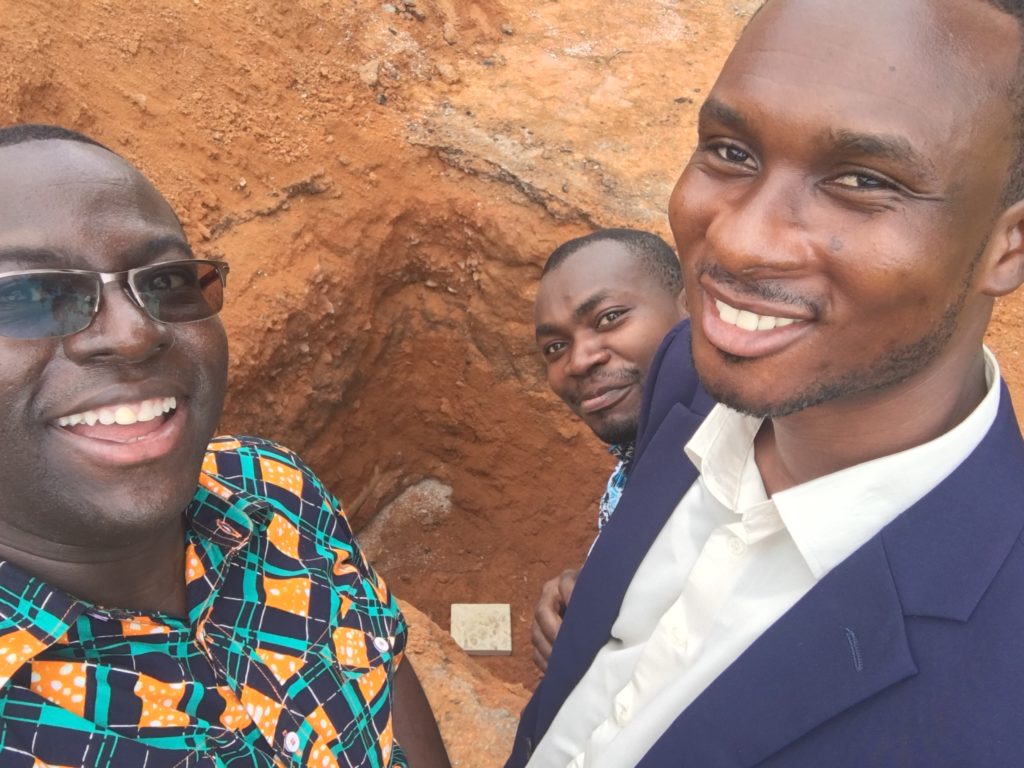
Sharing the joy of the National Cathedral groundbreaking moment (hole in ground with foundation stone from Jerusalem in the background) with two ‘next generation’ friends from Scripture Union and the Ghana Fellowship of Evangelical Students. Those two organizations have laboured to build the Ghanaian Christian ‘software’ for decades; may the ‘next gen’ see some ‘hardware’ too!
STATE-CHURCH PARTNERSHIP
In Part II of my cathedral trilogy I made mention of my alma mater, Achimota School. I still find it super intriguing that as a government institution the seventh and final ideal upon which the school was built was “the belief on which all else rest, in Jesus Christ as the revelation of all time and all people, of the love of God, and as the guide and pattern for our lives.” Today, postmodern Ghanaians cannot seem to wrap their minds around why the government of the day will support a clearly Christian venture even despite the fact that there are more Christians in the country now than there were in 1927. Meanwhile, the government of Ghana knows very well that without the Church’s partnership in education, health, agriculture etc. it cannot even run the country!
Many have criticized the ‘amorphous’ state-church partnership in the putting up of the National Cathedral Ghana. To be clear, the government is only gifting the land and seed money; the body of Christ in Ghana is to raise the remainder of the money for the project. I personally like that test. If truly, the majority of Ghanaian Christians are not in favour of building a national Christian monument of this stature to the glory of God at this time then this project should die a natural death because there will be no funds from government to complete it. On the other hand, if “the gracious hand of God” is upon the project, then like Nehemiah and Ezra who popularized that precious phrase, the heavenly King will provide a few strategic people and places to provide what is necessary to build and complete it in ‘fifty-two days.’
It is a bold move by the government of Ghana, this state-church partnership, in an era where many misunderstand, even misconstrue, the idea of ‘separation of church and state.’ It is heartwarming, to me, that the Executive branch of government’s decisive step in this direction was affirmed by the recent Supreme Court ruling to have the state unashamedly associate herself with the Christian community while providing the congenial environment for all other faiths to practice and even flourish. The Republic of Ghana’s Supreme Court’s ruling that “The State is free to lend support or aid to a religious group if it deems such beneficence to be for the good of the nation” is in order. According to the ruling, “Obviously, secularism in the context of the Ghana Constitution must be understood to allow, and even encourage State recognition and accommodation of religion and religious identity.”
Increasingly voices like Miroslav Volf have decried the challenge to and shrinking of faith in the public space. Ghanaians want to claim Ghana as a purely secular state yet what exactly is secular about borrowing the name of Almighty God in the national anthem and national pledge and swearing in national officers, including the President, by the Christian Bible. It is a good thing that this project is not solely a government one without the Christian community in Ghana not having skin in the game and a sense of ownership. On the other hand, it is a very welcome thing for the government to provide a logistical head start, legal framework and leveraging its convening power on behalf of the body of Christ.
In the President’s own words at the January 03, 2020 cathedral fundraising event in Kumasi: “It is my earnest wish that the building of the national cathedral should not be a burden on the state. That is why we are mobilizing the Christian community at home and abroad to join in partnership to raise the needed resources to build the cathedral. We seek to build this partnership on the rich history of the church’s involvement in our nation’s development. From agriculture, education, health amongst others, the church has been a major contributor to our national life and a strong partner of the state—which has chosen for its part to donate the land and a modest seed fund for this development in the partnership… This will be a historic coalition…” Indeed, the European missionary thrust of the 15th to 19th Century could not have been accomplished at the rate and scope it was without royal backing and national government resources of the Portuguese, Danes, English and such. This is not without it’s challenges, I know. But it’s our turn now.
Today, in the postmodern secularization of governments and separation of church and state we forget the things that made the countries we call “great” and “developed” today what they are–their Judeo-Christian roots. Even they forget the Christian ethos from which they were hewn! Shall we at least copy their foundations for the next 150 years and develop too and not buy into their current memory loss? The idea of a “Great Church for National Purposes” that was “non-sectarian and nondenominational” was not an afterthought in the design of the US capital, for example. Plan of the Federal City was developed in 1792 for Washington DC and discussed with George Washington, America’s first president. I will soon show, in my last point in this article, how the founding fathers of Ghana too envisaged a nation whose God is the LORD.
LEADERSHIP LINK
The Ghanaian Church is leading the world but we cannot lead our land? The most multinational church in the world today (with 106 nationalities) is pastored by a Ghanaian, church denominations have originated from Ghana and established presence in over 100 nations, the Global Christian Forum is headed by a Ghanaian, the Lausanne Movement even once described yours truly as occupying “a strategic global leadership role.” Several of the heads of churches that have spread from Ghana to multiple nations are leading this cathedral effort as advocates and trustees. Could they know and understand something that the rest of us rank and file members do not yet? The head of the largest and most global denomination in the country, Apostle Eric Nyamekye of the Church of Pentecost, says unequivocally: “Let’s unite behind the national cathedral.” Are all these seasoned, godly leaders of different persuasions of the Christian faith wrong about the national cathedral? If they are, then we’re in serious trouble as a nation!
Unity is key to all missions, particularly to the mission of God who is Himself completely one—Father, Son, Spirit. The Church has no mission without love and unity. Although there seems to be disagreement among a section of Christians about the relevance and priority of this colossal project in some quarters, on the contrary I have never seen the various denominational leaders in the country as united in their diversity over one thing like in this endeavour. Historically, Ghanaian Christians have never really been united enough to have one authoritative voice; there are at least three: the Christian Council of Ghana, the Catholic Bishops Conference and the Ghana Pentecostal and Charismatic Council. Take a look at the board of trustees of the National Cathedral Ghana and you will see an unusual confluence of the heads of denominations from all three Christian streams in our Republic at the table. I look to the leadership of those Jehovah, the Great Shepherd of the sheep, has placed over us in this dispensation as his under-shepherds, and trust that I can follow them as they follow Christ.
ELEPHANT IN THE CATHEDRAL
Whether we like it or not, there is a political aspect to religion just as there is a religious aspect to politics. The ‘elephant in the cathedral’ I speak of is not the New Patriotic Party’s mascot; no. The ‘elephant in the room’ is Islam. The fact that there is an Islamization of Ghana agenda is not unknown to some of us (it will require an entirely different lengthy, evidence-based piece at another time). Most countries in West Africa are either majority Muslim or about half so. Ghana remains a hub of Judeo-Christian vibrancy and as long as some of us are alive, we would want to keep it that way (and I’ll explain). This displeases many Mohammedans although the Judeo-Christian way of the 71% of Ghana’s population has allowed incredible freedom for a Muslim minority to have a couple of vice-presidents of our Republic, several ministers of state, a whole ministry for development of Zongos, state facilitation of pilgrimages to Mecca (at significant cost to the state), and freedom of worship to the extent of building one of the largest mosques in Africa on government-gifted land! Yet very much like Islam, that is not enough; they want it all.
I am so happy that our Muslim friends (and I have many!) can flourish in countries with majority Christians like Ghana, the USA, Canada, England and the like. Unfortunately, that favour isn’t reciprocated in Islamic republics and/or countries with Muslim majorities. As the debate over the cathedral raged one Muslim cleric in Accra even had the nerve to say that a cultural centre for all religions rather should’ve been built by government and not a cathedral to the God of the Christians. Ah! The National Cathedral Ghana is an emphatic statement that the Almighty God sang to in our national anthem and prayed to in our national pledge, is the Almighty God of Abraham, Isaac and Jacob and Father of our Lord Jesus Christ.
Why a national bias towards Christianity? I side with a couple of the founding fathers of the nation state Ghana. First is the one who actually christened us ‘Ghana’ instead ‘Gold Coast.’ Hear the erudite philosopher: “Christianity has all the values of an enlightened civilization that modern philosophy and modern society and modern democracy can give us… It is my view that this nation, above all, must attain the civilization of a Christian people if she is to be capable of fitting herself for her role, a mighty role in Africa…” (Danquah 1960). Said another, Dr. Ephraim Amu, regarding ‘The Path that Leads to National Greatness’: “our highest and greatest aspiration should be the kingship of God in individual hearts and throughout the nation and the whole continent” (Amu 1960).
A statement in the Cape Town Commitment of The Lausanne Movement should remind all and sundry that for us Christians, “Upholding human rights by defending religious freedoms is not incompatible with following the way of the cross when confronted with persecution. There is no contradiction between being willing personally to suffer the abuse or loss of our own rights for the sake of Christ, and being committed to advocate and speak up for those who are voiceless under the violation of their human rights. We must also distinguish between advocating the rights of people of other faiths and endorsing the truth of their beliefs. We can defend the freedom of others to believe and practices their religion without accepting that religion as true.” I cannot say the same for Islam.
CONCLUSION
We Africans are the descendants of those who built gigantic pyramids to honour dead pharaohs; do we now not have what it takes to build a monument to the glory of the Most High living God? The postmodern notion that faith has no place in the public space is scandalous, especially to the ‘incurably religious’ African. The National Cathedral Ghana is about more than a building; it is a key ingredient in the complex endeavour of nation building.
There are seismic spiritual shifts among the nations in nearly every generation which in turn redefine socioeconomic and other key realities and Ghana and Africa are in the midst of one such colossal change right now. Although few notice it, I hope this trilogy has thrown more light on the stirring of the waters going on in the realms of the spirit. Be warned that the smartest, most logical, most professional and other such voices we tend to listen to as ‘voices of reason’ in a modern democracy do not necessarily have the spiritual ability to discern the presence and activity of the Holy Spirit of God in our midst (I do not claim to be any better).
Even the President, I believe, is being moved by a Force greater than himself and buoyed upon a phenomenon he can neither fully comprehend nor control, making a stupendous move to advance a national cathedral vision that could even cost him an election as a politician. I reiterate that the extent that a National Cathedral advances God’s three-fold mission on earth as it is in Heaven, it is worthy of support of all who call on the name of the LORD and are called by the name of His Christ. History is being written right now by the missionary God. You watch and see. Time will tell; eternity too.
I am convinced: “The God of heaven Himself will prosper us; therefore we His servants will arise and build” (Nehemiah 2:20).
__________
In case you missed it, Part I of this trilogy may be found here.
References
Amu, Ephraim. 1960. ‘The Path that Leads to National Greatness,’ May 22, 1960.
Danquah, J.B. 1963. “African Culture and African Religion,” 15th March, 1963.
The Lausanne Movement. 2011. The Cape Town Commitment. Peabody, MA: Hendrickson Publishers.
GHANA’S NATIONAL CATHEDRAL: Even the President might have no clue what he is doing! | Part 2 of 3
Everyone’s talking Corona now (at the time of posting this). I find even scientists and doctors using words like ‘hope,’ ‘faith’ and ‘pray.’ In times like these we remember there is something beyond our five senses. Indeed, “Man shall not live by bread alone.” When you take a break from the virus that is being coronated, read about how the design of the National Cathedral Ghana CORONATES CHRIST the King in the African context.
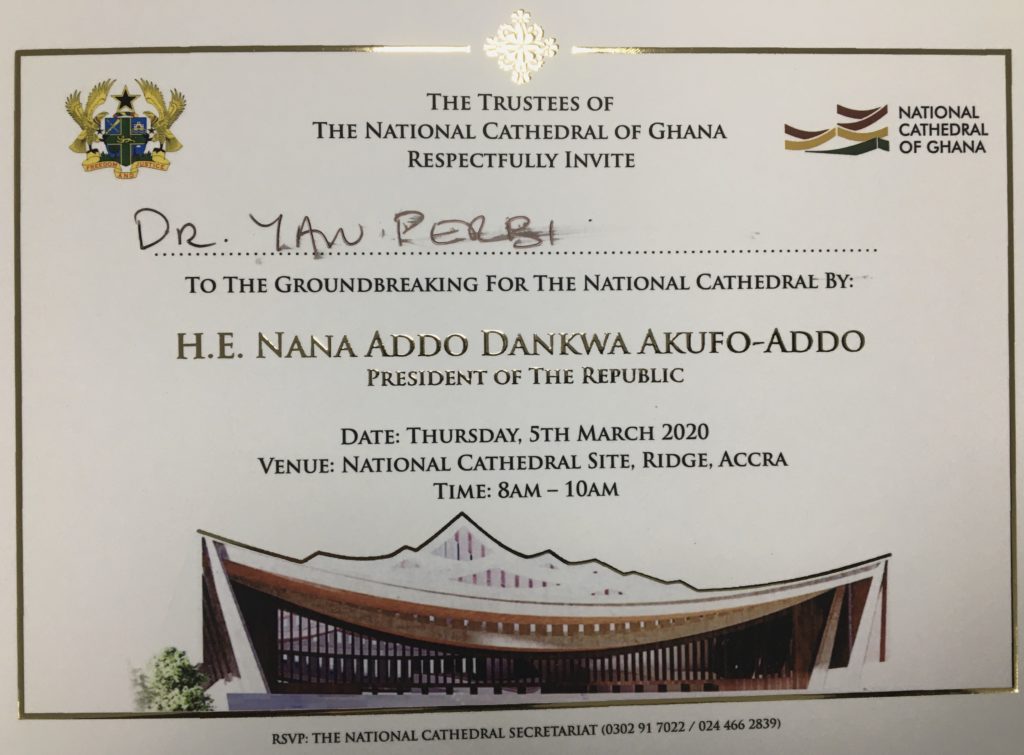
To the glory of God, I had the honour of receiving an official invitation to the historic, groundbreaking for the National Cathedral Ghana
CHRISTIAN SYSTEMS & STRUCTURES NEEDED
You have probably come across the line made famous by the late John Stott about certain people’s Christianity being “one mile long but an inch deep.” That, to a large extent, describes African Christianity (we’re not alone but Africa is my focus now). One of my biggest problems with Christianity in Ghana is the issue of large numbers of professing Christ followers yet such shallow discipleship and not enough positive impact on the spheres of society: arts & entertainment, business, education, family, government, media.
While desperately working on the issue of discipling the peoples of Africa themselves, we also have an equally important duty of discipling the structures and systems in Africa, from Archaeology to Zoology. In the famous words of former Dutch prime minister Abraham Kuyper, “There is not a square inch in the whole domain of our human existence over which Christ, who is Sovereign over all, does not cry, Mine!” I find that Europe, when it had the chance a millennium ago, and North America in the last 200 years, discipled the society’s structures and systems to the effect that today although these continents do not necessarily have the most numbers of self-identified Christ followers and are becoming increasingly secular, even atheists and agnostics ethically behave like Christians on account of the Judaeo-Christian influence over the centuries. Ask where the work ethic came from, for example, or even the notion of human rights. We have the opposite in Africa, where there are so many nominal Christians but our societal systems and structures are inadequately discipled. What has this got to do with the cathedral?
I was amazed when I heard the architect of the National Cathedral explain why that particular piece of land in Accra. Sir David Adjaye passionately speaks here about understanding the monumental core of Ghana’s capital, all a walking distance from the Independence Square: there’s the area our ancestors and heroes are buried (both military and civilian) and the State House and Parliament (with the international conference centre across it) where our current leaders to do their gig but what has been missing is the faith space, a “missing link in the nation’s architecture.” For an ‘incurably religious’ country, therefore, the National Cathedral finally becomes that sacred space and the people’s place. I like that we are structuring and systematizing what we believe in and putting our money where our mouth is in concrete structures at our national core.
It thrills me that beyond the cathedral as concrete (hardware) though, there is also the idea of the cathedral as convenor (software) of crucial national conversations regarding faith and public life to, as my professor friend Esi Ansah put it in a recent Face Book post, “build the cathedral within.” Whether hosted under the auspices of the National Cathedral Ghana (in name) or as the venue or both, these are the things that will reengineer our mindsets and attitudes, structures and systems, to see the transformative power of the Gospel on society. It will be a mistake to construct a physical cathedral without building the internal one as a people and systematizing what a cathedral to the most High symbolizes in our national attitudes and values. On the other hand, it is equally erroneous to say all we need to do is “build the cathedral within” without an outward expression of an inward and spiritual reality. This isn’t either/or but both/and.
We are building a nation here, a cohesive entity that must have spirit; not just a conglomeration of social services! My maternal grandfather, Emeritus Professor J.H. Kwabena Nketia, shared with me how he highly appreciated that about Ghana’s first president, Osagyefo Dr. Kwame Nkrumah. The latter knew we needed to garner the spirit of the people and not just their bodies. May the distillation of our Christian values and ethics into the physical cathedral structure and the centering of it in the monumental core of our national capital be a daily reminder and constant inspiration to think “freedom and justice” and all that is right/true and then to practice same always, to the glory of the God of Heaven.
AFRICA’S COME OF AGE
While the demolition of a few colonial buildings at the cathedral site is of sad note to some—but really, we have enough forts and castles and other buildings elsewhere as souvenirs of our sordid-but-should-not-be-forgotten past—in a sense it has been a statement that this young African country, Ghana, is cutting her teeth in this unavoidable intersection of gospel, culture and church. Any missiologist worth their salt should readily see the coming of age of African Christianity in this grand undertaking of a national cathedral. The idea wasn’t mooted by a white man nor the blueprint drawn by one; it shall not be built by Anglo-Saxons or Caucasians either. Although Africa actually shaped the European mind through the early church fathers like Tertullian and Augustine in the first 500 years of the Christian movement, our parts of the western coast of Africa were reached only in the last 500 years anno domini by sea-borne Europeans making some erroneously claim Christianity to be a “white man’s religion.” Christianity has been indigenous to Africa since the Ethiopian eunuch’s encounter with Apostle Philip in the first century!
Indeed, some white missionaries’ insistence on discarding our rich African traditions, the substitution of our meaningful local names with European ones like George (so-called ‘Christian names’), the condescending attitude towards our dress and manner of life etc. give just cause for rebellion against the faith they brought. But the missionary God Himself who made all people and is the originator of all that is good in all cultures (tainted by sin since the fall of man in Genesis 3) has revealed Himself in every culture so that all humankind may be drawn to Him. He has expressed Himself through each culture, including our approximately 80 languages in Ghana, that He may be seen, understood and worshipped.
The same day I attended the groundbreaking of the national cathedral on the eve of Ghana’s 63rdindependence celebration, my Achimota School year group began the formal activities for our 25th anniversary/homecoming celebrations and 93rd Founders Day activities. It struck me how the founding fathers of the school that has produced more Ghanaian (and African) heads of state than any other, wanted an institution whose ideals were “the belief on which all else rest, in Jesus Christ as the revelation of all time and all people, of the love of God, and as the guide and pattern for our lives” and simultaneously one where there was “respect for all that is true and lasting value in the old African culture, beliefs and ways of life.”
With the coming of age of African Christianity, the National Cathedral Ghana is a welcome discontinuation of European cathedral forms of the past, especially gothic architecture. Rather than spirals and bells, all that rings true and good in our old African culture, like the expression of divinity through umbrellas, has been adopted for this edifice. If Jesus Christ the King were to take on flesh in a Ghanaian culture, paramount chief of all of Ghana, how would that be expressed? You will notice from the cathedral design that the roof (as only one example) is wavy like the tapestry of royal umbrellas in durbars with the highest umbrella (highest point of the roof) being where Christ the King ‘sits,’ at the altar. This is one of the essential missiological thrills of the national cathedral.
For indeed, in the words of Kenyan theologian John S. Mbiti, “Christianity is always a beggar seeking food and drink, cover and shelter from the cultures and times it encounters in its never-ending journeys and wonderings” (Mbiti 1970, 438). Finally, there is an edifice of national stature that has offered the proverbial Ghanaian hospitality to the Christian faith in a deeply symbolic way. Christianity has taken on the cover of Ghanaian culture and has become authentically African. This is not a white man’s cathedral; this is our cathedral to the God of all the earth and of all flesh! As Mbiti states elsewhere, “…Europe and America westernized Christianity. The Orthodox easternized it. Now it’s our turn to Africanize it.” Yes, we have!
A LIGHT TO THE NATIONS
Many comparisons have been made between Ghana and Israel, some of which don’t hold water. However, Ghana, like ancient Israel, has apparently been selected by God as a covenant people to be a light to the nations (we will need a whole different article about prophecies made about Ghana). As the lode star of Africa, the “Black star of hope and honour to all who thirst for liberty,” neither our geographic or population size should warrant the prominent place we hold in Africa as the first country south of the Sahara to achieve independence from colonialism or any other accolade we’ve been showered with. Whether it’s our consummate idea of a united, free and prosperous Africa or producing a United Nations Secretary-General in the person of the late Kofi Annan, Ghana has throughout her history captured the imagination of Africans and the world at large. It is remarkable then that now, a landmark of Christian ideals and worship and a site for pilgrimage in Ghana will draw nations to our light (sure, and we’ll make some money too!). May the Queen of Sheba types travel over land, sea and air to come and see the marvels of the Holy One of Israel, the God of Abraham, Isaac and Jacob right here in Black Africa.
O that that we might have a taste of the future glory of Zion Isaiah prophesied, right where we are: Arise, shine, for your light has come, and the glory of the LORD rises upon you. For behold, darkness covers the earth, and thick darkness is over the peoples; but the LORD will rise upon you, and His glory will appear over you. Nations will come to your light, and kings to the brightness of your dawn. Lift up your eyes and look around: They all gather and come to you; your sons will come from afar, and your daughters will be carried on the arm. Then you will look and be radiant, and your heart will tremble and swell with joy, because the riches of the sea will be brought to you, and the wealth of the nations will come to you (Isaiah 60:1-5, NIV).
Among the sites within the National Cathedral Ghana will be Africa’s first Bible Museum and Documentation Center and replicas of significant places in the Bible like the walls of Jerusalem and the Garden of Gethsemane, right where we are, without a flight to ‘the Holy Land.’ The stone from Jerusalem that was brought in as a foundation stone during the groundbreaking has symbolically brought Jerusalem to Accra. Emmanuel! If God is with us, Jerusalem stone or not, then our land too, Ghana, has become holy ground.
TO BE CONTINUED here.
In case you missed it, Part I may be found here.
Reference
Mbiti, John S. 1970. “Christianity and Traditional Religions in Africa.” International Review of Mission, 59, no. 236 (October 1970).
GHANA’S NATIONAL CATHEDRAL: Even the President might have no clue what he is doing! | Part 1 of 3
There are seismic spiritual shifts among the nations in nearly every generation which redefine socioeconomic and other key realities. We are in the midst of one right now but few notice it. As they say, “the fish in the water doesn’t see the water.”
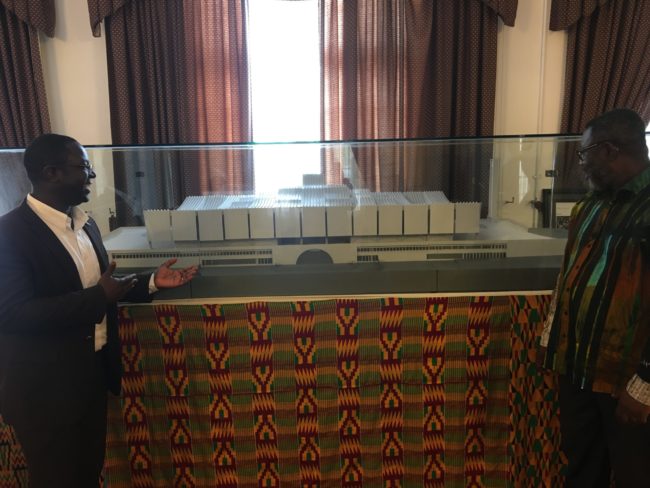
Viewing a model of the cathedral with the Executive Director of the National Cathedral Ghana secretariat a couple of days before the groundbreaking ceremony on 5th March, 2020.
The story is told of a delegation from a ‘backward’ African tribe that experienced the delight of their first plane ride en route to Britain. While their English tour guides thought they were making a great impression on these negroid visitors by the imposing size and stature of their financial buildings, civil service infrastructure and entertainment edifices like the Wembley stadium, these visitors’ eyes glossed over; seemingly disinterested. Unbeknownst to their hosts, they were by now really eager to see what they finally verbalized as “the God House.” When they eventually did, Westminster Abbey, I believe, they asked a question none of the Brits could ever have contemplated: “Why is the God House not the biggest building?” For them, the centrality and prominence of faith needed to be expressed in the sheer size of the space allocated to it. For others the measure of prominence and centrality might be portrayed in location and to some, the material and financial worth.
Whichever way, the African is arguably ‘incurably religious’ and that centrality of faith must be expressed as such. For the African, and Ghanaian for that matter, spirit takes the first place, for nature, the state, and man are all spiritual (Abraham 1970, 50-51) and the temporal and the non-temporal are fused (52). Some have even gone to the extent of claiming, “The African is a radically religious person, religious at the core of his or her being. Africans’ communal activities and their social institutions are inextricably bound up with the spirit world. […] Africans seem unable to explain life and its mysteries without some reference to the supernatural” (Pobee & Ositelu II 1998, 9).
HOW WE GOT HERE
It is not surprising then that like the Thessalonians in the first century when the Ghanaian people also “turned away from idols to serve the living and true God” we have sought to incorporate the God and father of our Lord Jesus Christ in our body politic. In fact, the original text of Philip Gbeho’s peri-independence national anthem (we still use his tune but the lyrics were changed after the first coup d’etat in 1966) were unequivocally to the Lord God of the Christian faith (who other faiths cannot bring themselves to call “father”):
Lord God our Father we pray thee,
Be thou our guide in all our ways,
May we unite together, proclaim the dawn of our new day!
Children of Ghana arise and uphold your cause
And blaze the trail of freedom far and wide,
O God our Father harken to our call
and bring us peace here in our fatherland.
When the president of the Republic of Ghana announced at the dawn of Ghana’s 60th independence anniversary in 2017 that he had plans to put up a national cathedral, “the God House” of the Ghanaian people if you like, I wasn’t excited. Initially. The intellectual in me (if I can claim that) sat on the fence to give this a deep think. When I asked in my August 2018 article, amidst serious brouhaha among the citizenry, whether this was a virtuous or vulgar venture I wasn’t kidding.
I will not repeat my thought processes and content then (you may revisit it here) but since undertaking graduate studies in world Christianity and missional leadership at Fuller Theological Seminary in the USA and at our own Akrofi-Christaller Institute of Theology Mission and Culture in Akropong, Akuapem, I have concurrently taken the time to research the matter and spoken with the real people at the helm and have become convinced that the National Cathedral Ghana venture is Godly, timely and defining in a way that I dare say, tafracher, even the President of the Republic himself who mooted the idea has no clue.
VISION IS PROGRESSIVE
According to His Excellency, President Nana Addo Dankwa Akufo-Addo, his three compelling reasons for this cathedral are (I’m paraphrasing what I heard him say in my presence at the March 5, 2020 ground-breaking of the national cathedral): first, to thank, praise and honour Almighty God for sparing Ghana major calamity, including civil war and famine (unlike most of our West African neighbors who we’re no better than) but rather blessing us with peace and relative prosperity; secondly, to galvanize the 71% Christian majority towards united effort in national development and finally to redeem a personal pledge he made to Almighty God that if He helped him win the 2016 election after two unsuccessful attempts he would erect a national cathedral to His honour.
All of these are good, and in my opinion, in that order. But as a missiologist, one who sits at the intersection of gospel, culture, and the church, there is so much more going on in the world of faith and religion that makes the idea and timing of this cathedral so iconic, it cannot be a coincidence and certainly not ignorable. I seek to therefore elevate this conversation beyond partisan politics and above the utilitarian rhetoric, especially on social media, typically by an elite that are book-smart but may not necessarily be spiritually discerning and tend to be more secular humanist in outlook than they even realize. Of course, I write from a Biblical worldview with an unashamedly Christian bias. Everyone is biased; it’s only worse when one doesn’t know it or wouldn’t acknowledge so.
THIS IS OF GOD, THE MISSIONARY GOD
First of all, it is Almighty God who forms nations (Acts 17:26) and nation states, “people groups who recognize themselves as a coherent community with a political meaning, and are generally larger than tribe or clan” (Lyman Stone). The missionary God forms nations for His three-fold purpose to bring:
- Himself glory through the praise and worship of their lips and love and lives thereof,
- creation a blessing (especially human beings, who are made in His image and likeness) and
- evil to an end by vanquishing it and establishing His kingdom of righteousness, justice and equity.
The Christian God forms nations for His glory to be displayed in and through them to the extent that even at the end of time, when the new and heavenly Jerusalem is revealed, the nations bring their leaders and glory (from languages to whatever cultural idiosyncrasies) into the city (Revelation 21). What will Ghana(ians) bring?
I am one of those who interpret the name G-H-A-N-A as an acronym for God Has A Nation Ahead. There is so much yet to be actualized in this great land. The National Cathedral Ghana can easily become a Tower of Babel experience if it does not fulfill God’s three-fold mission delineated above. Those people who settled on the plains of Shinar and became Babel (‘a people of confused noise’) sought glory for themselves and not the Most High God (they wanted make a name for ourselves) and did not want to be dispersed to spread God’s glory and be a blessing to the whole earth. The moment our sense of nationalism overtakes God’s global mission and our pride gets in the way of His purposes, you can be sure this project and its people will be scattered and the venture aborted. To the extent that a National Cathedral advances God’s three-fold purpose on earth as it is in Heaven, it is worthy of support. “Is it not written: ‘My house will be called a house of prayer for all nations?’ Jesus asks us like he did the first century Jews. Woe betides us if it becomes ‘a den of robbers.’ The National Cathedral Ghana is a significant missiological statement, in brick and mortar, that the Kingdom of God has more fully come in Africa and from here, Ghana as the geographical centre of the earth, will radiate to all the nations of the earth.
AFRICA LEADS TODAY
Throughout history, God has moved the centre of his missionary activity: Jerusalem, Antioch, Constantinople, Rome… He has particularly done so when His people lose mission vision. While the East was at the helm in the first 1,000 years after Christ’s ascension, the West led the missio Dei for the next 1,000 years in sheer numbers as well as missionary activity. In this 21st century, everything has changed. Missiologists the world over agree: The centre of gravity of Christianity has shifted from the Global North to the Global South i.e. to Africa, Latin America and Asia. For the first time, the top two continents with the most Christians are Africa and Latin America, breaking a 1,000-year record Europe held. I am in the throes of completing a book on how Africa has transformed from a mission field into a mission force.
The year 2018 was the first year recorded with more Christians in Africa than on any other continent. That is phenomenal, that a continent called ‘dark’ that had barely 9 million Christ followers at the beginning of the 20th Century would now have over 650 million in 2020! The places that have had their historic cathedrals are today slowest in Christian growth but have significantly deep roots. Shall the place leading the world in the Christian faith not have a place to celebrate it, symbolize it, embody it and consolidate it and from there be a launch pad to the rest of the world? I feel privileged to be alive to see a day no one could’ve envisaged a century ago! Let this cathedral stand for the dawning of this new era of African leadership of the global mission of God and symbolize the celebration of this epoch!
TO BE CONTINUED.
Part II continued here.
References
Abraham, Willy E. 1970. The Mind of Africa. Chicago: The University of Chicago Press.
Pobee, John S., & Gabriel Ositelu II. 1998. African Initiatives in Christianity: The Growth, Gifts and Diversities of Indigenous African Churches; A Challenge to the Ecumenical Movement. Geneva: WCC Publications (Risk Book Series, no. 83).
Growing SMALLer
What Transpired in Court: a Blow to Blow Account
The day after my trial I sent a newsletter to all my family, friends and ministry partners around the world who had been praying for righteousness, truth and justice to prevail, giving them a ‘blow to blow’ account of happenings on that eventful day, November 28, 2018. You may read it here. Acquitted! Discharged!! Free!!!

